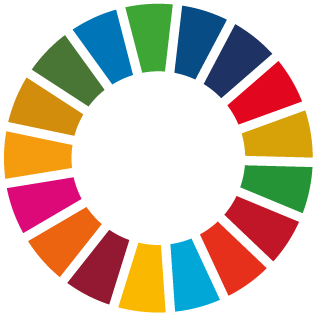
‘We need a global re-affirmation of commitment to the SDGs’
An interview with the Chair of the GIZ Management Board on the mid-term review of the 2030 Agenda. Thorsten Schäfer-Gümbel speaks about the responsibility of the Global North, the interlinkages between environmental, economic and social factors, and points out that solidarity is an intrinsic part of GIZ staff’s make-up.
Mr Schäfer-Gümbel, what part does the 2030 Agenda play in a world dominated by global challenges?
An incredibly important one! Eight years ago, the international community adopted the 2030 Agenda, its five principles and its 17 Sustainable Development Goals or SDGs, setting their sights on a fairer and more sustainable world.
The setbacks we have sustained as a result of worsening climate change, the impacts of the COVID-19 pandemic and the Russian war of aggression against Ukraine only underline the urgency of this change of direction.
What is more, although global events are impacting negatively on the 2030 Agenda, we can see that individual SDGs can actually offer incredible leverage where crises meet implementation. I’m thinking here about SDG 5, for instance – gender equality. We know that strengthening marginalised sections of society has a positive impact on changes in a society as a whole.
Nevertheless, the global mid-term review will indicate only modest progress …
We still have a long way to go to achieve social justice, food and nutrition security, adaptation to climate change and many more goals. We will be able to master these challenges only if we work together. The international community must not let up in its efforts over the next seven years. Indeed it must step up these efforts. We need a global re-affirmation of commitment to the SDGs.
I believe that the industrialised countries have a clear share of responsibility to promote development worldwide and make states and societies more resilient in the long term. The UN’s SDGs are the yardstick we use to measure progress here. If we, in international cooperation, focus to the same extent on the environmental, economic and social issues, we can bring about lasting changes to people’s lives and prospects, and to the natural environment, and underpin these.
What exactly does the transformation agenda mean for GIZ?
The 2030 Agenda provides the framework for action for German development cooperation and thus acts as a compass for our work. We have fully integrated the 2030 Agenda in the planning, implementation and monitoring of all new projects.
The implementation principles are our guide rails. Let’s take the principle of integrated approaches by way of example. Achieving climate neutrality is a huge challenge for many regions around the world, including the South African province of Mpumalanga. About 80 per cent of all South African coal is mined there.
To give the people who live in the area prospects of a better future, GIZ is working on behalf of the German Federal Ministry for Economic Affairs and Climate Action to support a just transition. The goal is to create jobs and green value. The work of miners, truck drivers and traders has been closely intertwined with the coal mining industry to date.
GIZ is organising retraining and working with partner organisations to find investors willing to develop viable sectors of the economy, including agriculture, ecotourism and renewable energies.

“We can achieve the SDGs only if the Global North accepts its responsibility.”
How is GIZ implementing the principle of leaving no one behind, the idea of solidarity?
We advise the political level in our countries of assignment, so that the sections of the population who are worst hit by crises are given special consideration.
In specific terms, this means building social protection systems, that step in for instance when harvests are lost due to climate change. In case of flooding, as in Pakistan last year, a new registration system helped a large number of people access social benefits more rapidly.
In line with the principle of universality, however, it is also clear that we can achieve the SDGs only if the Global North accepts its responsibility. We look particularly critically at supply chains, to ensure they are sustainable, socially equitable and transparent.
On behalf of the Federal Development Ministry, we are networking factory workers in Bangladesh who want to advocate more for their own rights. Women’s cafés provide a safe space where they can hold discussions.
Interconnected crises place additional demands on development cooperation. What does this mean for GIZ?
GIZ is called on to act in its capacity as an implementing organisation. Our new Corporate Strategy aims to hone excellence, digitalisation and partnership at GIZ. Thus, even in times of multiple crises we can respond effectively, flexibly, and swiftly.
One important point here is to make more use of instruments and approaches that have already proved successful – regionally or in other country contexts – thus establishing standard practices, and saving time and resources.
We also want to develop partnerships on the ground with bodies from civil society to central government level, and help them improve their service delivery. Our approach is always to establish cooperation arrangements, with the digital sector and foundations too, in order to pool our expertise and our resources. This allows us to be more effective and more efficient, and better achieve our goal of sustainable development.
How can digitalisation help underpin this integrated approach?
Digitalisation is also a driver of development and thus an opportunity.
In Malawi, GIZ and UNICEF together set up a drone academy for aspiring pilots. This creates jobs and high-speed supply chains. Drones can be used to fly urgently needed medicines to remote areas, reaching more than 750,000 people. The drones collect data en route that can be used in the agricultural sector too, for example, to plan sowing. This makes supply chains robust and creates jobs, not just for drone pilots, but also for data analysts.
GIZ is coordinating the drone network and advising the Malawian Government on further expanding transport. In this way, drone technology is spurring the country’s technical and agricultural development, strengthening health care and making the country more resilient.
Mr Schäfer-Gümbel, you’ve been at GIZ for almost four years now, and since last November you’ve been Chair of the Management Board. Can you give us an example of something you have particularly admired since you joined GIZ?
Two years ago, in the face of the disastrous flooding in parts of Rhineland-Palatinate, GIZ staff members got together to organise spontaneous support and assistance. This staff action group is now firmly established and responds to recurrent international emergencies, including Russia’s war of aggression against Ukraine.
This engagement is an expression of vibrant solidarity and I am delighted to see it. I genuinely believe that this is an intrinsic part of the make-up of GIZ. There is always someone ready to help. I find that very moving in each specific situation, and overall it is truly impressive. It calls for respect and it is something that has impressed me very much since I joined GIZ.
I would like to see all colleagues retaining this enthusiasm and continuing the good work.